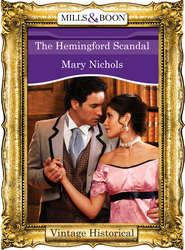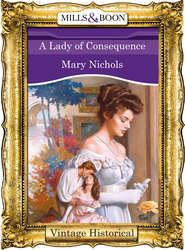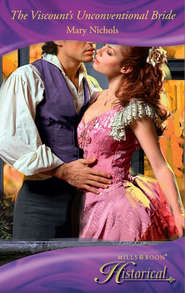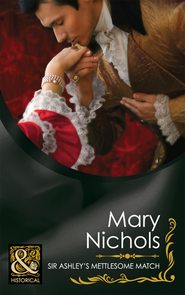По всем вопросам обращайтесь на: info@litportal.ru
(©) 2003-2024.
✖
In the Commodore's Hands
Настройки чтения
Размер шрифта
Высота строк
Поля
The crowd had reached the courtyard and had set up the tree in the middle of it. There was a traditional belief that if a May Tree was put up in the lord’s courtyard and hung with small sacks of grain and chicken feathers, the peasants were telling their seigneur they thought his dues excessive and if it was kept standing for a year and a day, they would be free of their dues to him. Lately the May Tree had become the Liberty Tree and now it symbolised the freedom given to the people by the new Constitution and their contempt of the lords of the manor.
They were calling on the Comte to show himself and Lisette repeated her plea that he should leave. ‘You can come back when they have gone away again.’
He smiled, adjusted the lace frills of his shirt sleeves and straightened his shoulders to go and meet them. On the way out he passed a gilded mirror and stopped to straighten his wig and give a tweak to his neckcloth, settling the diamond pin more securely in its folds. Then he nodded to a footman who opened the door for him.
His appearance at the top of the steps seemed to inflame the mob. They all began shouting at once. ‘Give us back what is due to us,’ one man yelled. ‘You have been bleeding us dry for years, you and the rest of your aristocratic friends. You are rich and we are poor and that situation has been denounced by the new government. Even King Louis thinks it is wrong. The rich can afford to pay, we can’t…’
‘I have to pay taxes too.’ The Comte attempted to make himself heard, but they were in no mood to listen.
‘You have no right to our taxes.’ The speaker was a big man, dressed in a faded black suit and wearing the red cap of the Revolutionaries. Lisette knew him as Henri Canard, a lawyer and ardent Revolutionary who led the local peasants, rousing them from their apathy to take part in demonstrations against the nobility. ‘You have no title to the land you hold.’
‘I certainly have. My grandfather bought it…’
‘Obtained by trickery,’ Canard said, taking a step or two towards the Comte, his dark eyes gleaming, a threat in every gesture. ‘We demand restitution.’
‘I cannot pay what I do not have.’
‘Then we’ll take what we want in kind,’ someone yelled. ‘I’ll have that diamond pin in your cravat.’
‘And I’ll have the silk cravat,’ cried another.
‘I think we should lock him in prison until he pays,’ added a third. ‘See how he likes prison fare. No more fat pigeons until he pays what he owes.’
‘À bas les aristos! Down with all aristocrats!’ This became a growing chorus and they milled round Gervais and began pulling at his fine clothes. Lisette ran to intervene, but was pushed roughly aside. Having divested him of everything except his breeches and shirt, they put him in the tumbril while others entered the house and began gathering items they thought they could use or sell and piling them into the cart alongside the Comte. Some went into the cellars and emerged carrying bottles of Calvados, still more invaded the pigeon loft and wrung the necks of several birds before the remainder flew off to safety. Lisette watched in horror as they set off again, taking her father with them. One of the crowd was even wearing his wig and laughing at his own cleverness.
She ran after them, pulling on Henri Canard’s arm. ‘Let him go,’ she cried. ‘He is an old man and has done you no harm. You can keep the other things, just let him go.’
‘He needs to be taught that the old order is gone,’ the man retorted, shaking off her hand. ‘We are all equal now. If prison is good enough for those of us who cannot pay our taxes, it is good enough for him who will not.’
She continued to run alongside him. ‘What are you charging him with?’
The big man laughed. ‘Withholding what belongs to the people, plotting against the State, hiding a refactory priest. I am sure we can find something.’ The National Assembly had confiscated all Church property and stripped the clergy of their rights, requiring them to sign an oath of loyalty to the new regime. Those who did so were allowed to remain at their posts and paid a stipend by the state, making them virtually civil servants. Those who refused were not allowed to practise; they could not say mass or officiate at funerals, baptisms or weddings. They either fled the country or went into hiding and practised secretly. The Comte was known to have sheltered one of these until recently when the poor man had died—of a broken heart, so her father maintained.
‘And you would do that to an innocent old man?’
‘Innocent, bah! Now out of the way, before we put you in the cart along with him.’
She fell back and the crowd passed her and bore her father away. She needed help and the only person she could think of was her twin brother, Michel. He was an equerry at the court of King Louis. If Louis ordered the mob to release her father, they would surely obey.
She returned to the château and set the servants clearing up the mess, then made preparations to leave for Paris. Hortense, her faithful duenna, packed a small portmanteau and Georges, their coachman, prepared the travelling carriage and harnessed the horses. She would travel faster without a large entourage, but Georges insisted two of the grooms should ride alongside, armed with pistols. It was not going to be an easy journey and would take at least three days.
Lisette had always been close to her brother. There had been no families of equal status close by as they grew up, no children with whom they could associate, so they had spent all their time in each other’s company, especially when their mother died. Their father had been too immersed in his grief to pay attention to them and it was Michel, miserable himself, who had tried to comfort her.
Physically they were very alike, though she was an inch or two shorter than her brother, and good living at court had made him heavier. They both had fair hair and grey-blue eyes. She was unusually strong, probably due to the rough games she played with Michel when they were children, and because she had taken over her mother’s role in the household she was used to giving orders and having them obeyed. Michel laughingly called her bossy and perhaps she was. She had tried, in her rather confused way, to take the place of her mother and her brother in her father’s life and feared she had failed on both counts.
She was convinced that was the reason for her single state at the age of twenty-five. Five years before Papa had taken her to Paris and introduced her to any number of eligible young men, but nothing had come of it. Perhaps she was too particular, perhaps reluctant to give up the independence she was used to, or perhaps, as she later suspected, they were put off by her unfashionably lean figure and self-sufficiency. They had come home again with Papa grumbling he had wasted his money and she might as well have married Maurice Chasseur in the first place.
Maurice Chasseur lived in Honfleur and his parents had earlier talked to her papa about a possible match, but when the young man was approached after they returned from Paris, he flatly refused to co-operate, saying she was too hoydenish, more boy than girl, and he was not at all surprised none of the Parisian eligibles had wanted to take her on, not even for a fortune. The remark had come to her through a servant in his father’s household who had relayed it to Hortense.
‘He is simply annoyed because your papa hoped to do better for you and, when nothing came of it, went back to him and he didn’t like the idea of being second-best,’ her maid had told her by way of comfort. But it had hurt far more than she cared to admit and left her firmly convinced she was unmarriageable. It had become even more imperative to maintain her life at the Château Giradet and hang on to whatever privileges that still remained.
She was not an ardent royalist; she deplored the extravagance of the King and his court, the secret whisperings of scandal, the way favours could be bought and sold and the courtiers indifference to the suffering of the poor, made worse by the Revolution that should have eased it. Neither did she like the way the country was being run, the summary justice and injustice, the constant edicts that confused rather than enlightened. Surely, she thought, there must be a middle way, something like the English system where King George ruled in a democracy, though it was said he was mad.
The countryside they passed through was showing signs of poverty and neglect. The fields were not tended as well as they once had been, the livestock grazing on the meadows was thin. Everywhere had an overgrown, neglected air and the people who watched the carriage pass were poorly clad. Some looked on with the dull eyes of dejection, others were angry and spat at the coach as it passed. Lisette was thankful for their escort, especially when they stopped each night at posting inns.
Paris, when they reached it three days later, was seething with discontent. Everywhere—in the crowded narrow alleys, in the wider main streets, in the squares and public buildings—noisy crowds gathered, sporting red caps or wearing a red, white and blue cockade in their hats. The carriage made slow progress, being frequently stopped and searched on its way to the Tuileries Palace, where the King held court. He had been forced to leave his preferred home at Versailles by a mob of women who thought he should be with his people in the capital where they could keep an eye on him. Lisette was thankful when the carriage drew up in the main courtyard of the palace and she was able to go in search of her brother, followed by the rather nervous Hortense.
There was an air of agitation mixed with despondency in the demeanour of those she encountered as she hurried through the maze of corridors to reach Michel’s apartment. People were either hurrying from one place to another or huddled in groups, whispering. They stopped their chatter as she approached and watched her pass without speaking. No one challenged her.
She was admitted to the apartment by Michel’s valet, Auguste, who invited her to be seated and went off to tell his master she was there. The room, not one being in the front of the building where the public were admitted, was shabby. Whether that was a sign of the times she could not tell.
‘Lisette, what are you doing here?’ Michel demanded, emerging from his bedchamber in nothing but breeches and a silk shirt, followed by Auguste with a fancifully embroidered waistcoat into the sleeves of which he was endeavouring to put his master’s arms. ‘I am about to attend the King. And where is Papa?’
‘Papa has been seized by a mob and taken to the prison at Honfleur.’
‘Mon Dieu! Whatever for?’
‘For refusing to remit the taxes he has collected over the years. They seemed to think they had the King’s blessing to demand them back. They stole pictures and plates and bottles of Calvados and wrung the necks of some pigeons as well.’
‘That’s ridiculous, the King would never sanction that. He is not in a position to sanction anything. Since his failed attempt to flee the country, he is no more a free subject than our father.’
Lisette’s heart sank. ‘I was hoping for his intervention.’
‘Not possible, I’m afraid.’ Auguste had succeeded in putting on the waistcoat and tying his master’s cravat and was now in the bedroom fetching his wig and coat.
‘What are we going to do, then? I can’t leave Papa to rot in gaol, can I?’
‘You could ask the Citizen Deputy for Honfleur to intervene. Let him earn his keep.’
‘I did that on my way here. He refused on the grounds that justice must run its course. Is there no one in this benighted country that can do anything but rant and rave?’
Michel was thoughtful for a moment. ‘You could try Sir John Challon.’
‘Sir John! What can he do?’
‘He’s English, he might know someone in authority in England who could be persuaded to help, especially since our dear mama was English.’
Sir John Challon was a neighbour and lifelong friend of her father’s. He had been a firm supporter of the exiled King James of England and came to France shortly after the abortive uprising of the Jacobites.
‘But he’s an old man, older even than Papa.’
‘What is that to the point if he can summon others to our aid?’
‘Then I must return home.’
‘Yes, you must, Paris is not safe for you. The outcry against the aristocracy is becoming more vociferous. It does not look good for any of us.’
‘But what about you?’











